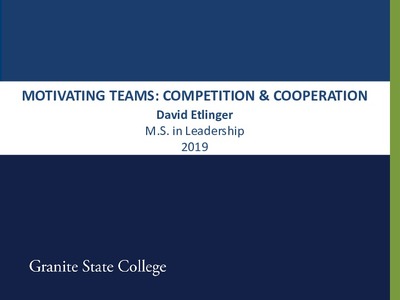Motivating Teams: Competition and Cooperation
Motivating Teams: Competition and Cooperation
| dc.contributor.author | Etlinger, David | |
| dc.date.accessioned | 2022-01-05T14:36:39Z | |
| dc.date.available | 2022-01-05T14:36:39Z | |
| dc.date.semester | Winter 2019 | |
| dc.identifier.uri | https://archives.granite.edu/handle/20.500.12975/364 | |
| dc.description | The purpose of this research study was to explore the potential merits, namely in regard to individual worker motivation, of an approach to leading teams utilizing both competitive and cooperative structures. A literature review was conducted to establish a foundation of pre-existing research on the definitions, benefits, and drawbacks of competition and cooperation in professional organizational settings, as well as how employee motivation relates to self-interested and prosocial orientations to group membership. This research influenced the development of a hypothesis statement: Since teamwork represents a mixed motive situation of self-interested and prosocial orientations, team leaders will observe higher levels of individual worker motivation by applying a mixed approach, fostering both competitive and cooperative forces. This hypothesis was tested with quantitative analysis of self-reported survey data, which sought to identify motivational outcomes resulting from competitive and cooperative influences. Interpersonal intrateam relations was a prevailing theme in the research, though intrapersonal, inter-team, and inter-organizational relationships are also discussed. | |
| dc.title | Motivating Teams: Competition and Cooperation | |
| dc.title | Motivating Teams: Competition and Cooperation |


